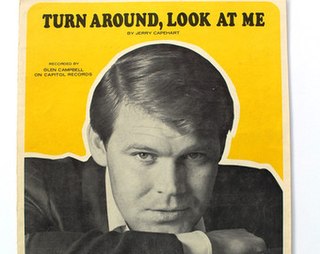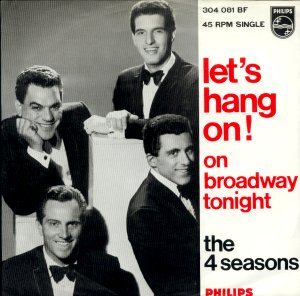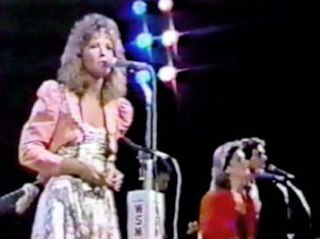Related Research Articles
Joel Carver Whitburn was an American author and music historian, responsible for setting up the Record Research, Inc. series of books on record chart placings.
"Too Young" is a popular song, with music written by Sidney Lippman and lyrics by Sylvia Dee. A recording of the song was released by Nat King Cole in 1951, which reached No. 1 in the United States and became the best-selling song of the year. The song was an early attempt by music labels to appeal to the younger demographics and its success later led to a boom of music that caters to the young. Another successful version was released by Donny Osmond in 1972.
"Last Kiss" is a song released by Wayne Cochran in 1961 on the Gala label. It failed to do well on the charts. Cochran subsequently re-recorded his song for the King label in 1963. It was revived by J. Frank Wilson and the Cavaliers, who took it to number two on the Billboard Hot 100 charts. Wednesday, Pearl Jam, and several international artists also covered the song, with varying degrees of success. The song was one of several teen tragedy songs from that period.

"Since I Don't Have You" is a song written and composed by Jackie Taylor, James Beaumont, Janet Vogel, Joseph Rock, Joe Verscharen, Lennie Martin, and Wally Lester. It was first a 1958 hit single for the doo-wop group the Skyliners on the Billboard Hot 100. Country music singer Ronnie Milsap had a hit with the song in 1991. American hard rock band Guns N' Roses also had some success in 1994 with their version of the song which reached the top 10 on the UK Singles Chart.

"Breaking Up Is Hard to Do" is a song recorded by Neil Sedaka, co-written by Sedaka and Howard Greenfield. Sedaka recorded this song twice, in 1962 and 1975, in two significantly different arrangements, and it is considered to be his signature song. Between 1970 and 1975, it was a top-40 hit three separate times for three separate artists: Lenny Welch, The Partridge Family and Sedaka's second version.

"Turn Around, Look at Me" is a song written by Jerry Capehart and Glen Campbell, though Campbell is not officially credited.

"Let's Hang On!" is a song composed by Bob Crewe, Sandy Linzer, and Denny Randell that was popularized by the Four Seasons in 1965.

"Day After Day" is a song by the British rock band Badfinger from their 1971 album Straight Up. It was written by Pete Ham and produced by George Harrison, who also plays slide guitar on the recording. The song was issued as a single and became Badfinger's biggest hit, charting at number 4 in the United States and number 10 in the UK, ultimately earning gold accreditation from the Recording Industry Association of America.

"If My Heart Had Windows" is a country song written by Dallas Frazier and recorded by George Jones in 1967 on his album of the same name. Released as a single that year, Jones's version peaked at number seven on the Billboard Hot Country Singles charts.

"To Have You Back Again" is a song written by Annie Roboff and Arnie Roman, and recorded by American country music artist Patty Loveless. It was released in January 1998 as the second single from her album Long Stretch of Lonesome.

"We'll Sing in the Sunshine" is a 1964 hit song written and recorded by Gale Garnett which reached No. 2 in Canada, and No. 4 on the U.S. Billboard Hot 100 chart for the week ending 17 October 1964. It also enjoyed success on easy listening and country music radio stations, spending seven weeks at No. 1 on the Billboard Easy Listening chart and No. 42 on the country chart. The Cash Box Top 100 ranked "We'll Sing in the Sunshine" at No. 1 for the week of 31 October 1964, and it also reached No. 1 in Garnett's native New Zealand that November. In Australia, "We'll Sing in the Sunshine" afforded Garnett a Top Ten hit with a No. 10 peak in October 1964. Garnett's sole Top 40 hit, "We'll Sing in the Sunshine" won the Grammy Award for Best Ethnic or Traditional Folk Recording in 1965.
"There! I've Said It Again" is a popular song written and published by Redd Evans and David Mann in 1941. In early 1945, Vaughn Monroe and his Orchestra released Victor 20-1637, which reached the number one position on the Billboard's National Radio Airplay chart for five straight weeks, then no.2 for six more weeks, and a total run of 29 weeks. It finished 1945 as the no. 4 record of the year.

"Love on a Two-Way Street" is a soul ballad written by Sylvia Robinson and Bert Keyes in 1968. The song was originally recorded by Lezli Valentine, an artist signed to All Platinum, the record label that Sylvia Robinson co-owned with her husband, Joe. The song was then recorded by The Moments, an R&B vocal group signed to All Platinum subsidiary Stang Records, as filler for their 1968 album Not on the Outside, But on the Inside, Strong!. Sylvia and Joe decided to release the song as a single in March 1970 and it went on to become one of the biggest R&B hits of that year, spending five weeks at number one on Billboard's Soul Singles chart and reaching number three on the Hot 100 chart. Billboard ranked the record as the No. 25 song of 1970. It was also certified gold by the RIAA for sales of one million copies.

"Sometimes Love Just Ain't Enough" a duet between American singers Patty Smyth and Don Henley. The rock ballad was written by Smyth and Glen Burtnik and was released as a single in August 1992. It reached No. 1 in Canada, where it was the most successful single of 1992, and peaked at No. 2 in Ireland and on the US Billboard Hot 100.

"Even the Nights Are Better" is a 1982 song by the British/Australian soft rock duo Air Supply, released on their seventh studio album Now and Forever (1982) as the album's first single. It first charted in the United States on the Billboard Adult Contemporary chart, where it spent four weeks at No. 1 in July and August. This was Air Supply's third song to reach the summit on this chart. It also reached No. 1 on the Canadian AC chart.

"What You Won't Do for Love" is a song by American singer-songwriter Bobby Caldwell. It was released in September 1978 as the lead single from his eponymous debut album (1978). It was written by Caldwell and Alfons Kettner, and produced by Ann Holloway. The song has been covered and sampled numerous times, including by Tupac Shakur in the posthumous 1998 hit "Do for Love".

“Say, Has Anybody Seen My Sweet Gypsy Rose” is a 1973 song by the American pop music group Tony Orlando and Dawn. Written by Irwin Levine (lyrics) and L. Russell Brown (music), it was included on the group's 1973 album, Dawn's New Ragtime Follies.

"Never Ending Song of Love" is a song written by Delaney Bramlett, and, according to some sources, by his wife Bonnie Bramlett. It was originally recorded with their band, Delaney & Bonnie & Friends, in 1971 on the album Motel Shot. Released as a single by Atco Records the same year, "Never Ending Song of Love" became Delaney & Bonnie's greatest hit on the pop charts, reaching a peak of No. 13 on the Billboard Hot 100 and No. 8 on Easy Listening. It reached No. 16 in Australia.

Johnny Mathis has recorded 73 studio albums, 10 of which achieved sales of 500,000 units and were awarded Gold certification by the Recording Industry Association of America. Six of his compilation albums also accomplished this, and of these 16 Gold albums, six eventually went Platinum by reaching sales of one million copies. In 1999, sales figures totaled five million for his first holiday LP, Merry Christmas, and three million for Johnny's Greatest Hits, a 1958 collection that has been described as the "original greatest-hits package" and once held the record for most weeks on Billboard magazine's album chart with a total of 490. His second longest album chart run was the 295 weeks belonging to his Platinum 1959 album Heavenly, which gave him five weeks in the top spot. In a ranking of the top album artists of the last half of the 1950s in terms of Billboard chart performance, he comes in at number two, for the 1960s, number 10, and for the period from 1955 to 2009 he is at number six.

"How Sweet It Is (To Be Loved by You)" is a song recorded by American soul singer Marvin Gaye from his fifth studio album of the same name (1965). It was written in 1964 by the Motown songwriting team of Holland–Dozier–Holland, and produced by Brian Holland and Lamont Dozier. The song title was inspired by one of the actor and comedian Jackie Gleason's signature phrases, "How Sweet It Is!"
References
- ↑ Billboard, Allmusic.com
- ↑ "Camden People - Patty and the Emblems".
- ↑ "Item Display - RPM - Library and Archives Canada". Collectionscanada.gc.ca. 1964-08-11. Retrieved 2018-03-14.
- ↑ Joel Whitburn's Top Pop Singles 1955-1990 - ISBN 0-89820-089-X
- ↑ "Cash Box Top 100 Singles, August 8, 1964". Archived from the original on March 14, 2018. Retrieved March 14, 2018.
- 1 2 Joel Whitburn, The Billboard Book of Top 40 Hits. 7th edn, 2000